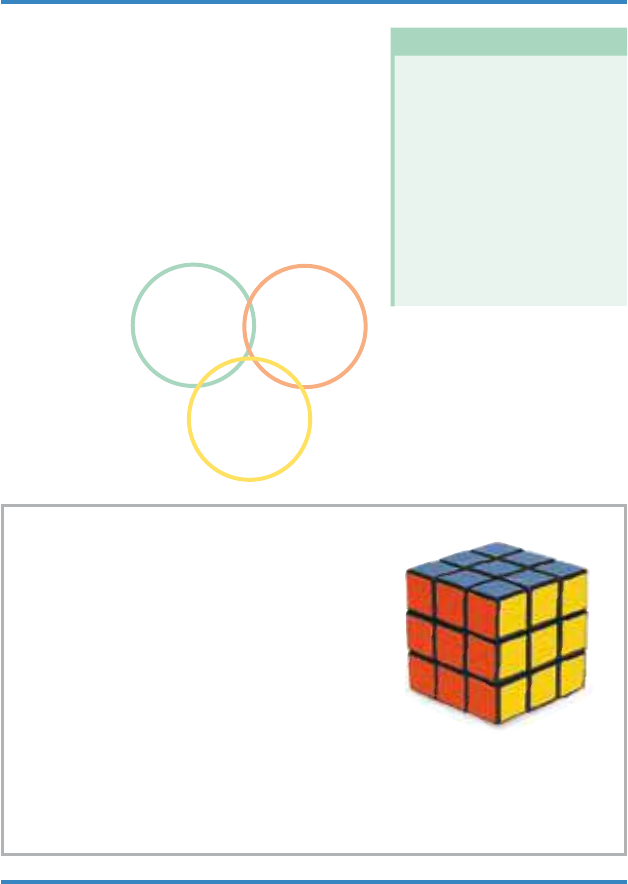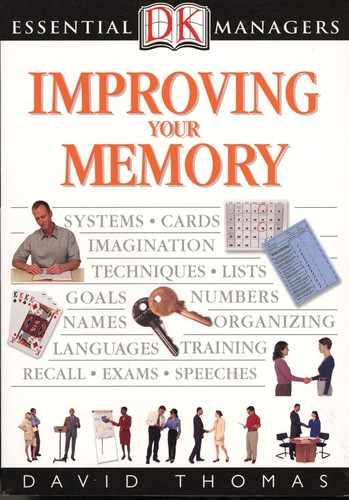
6
Understanding Memory
What Is Memory?
M
emory defines us as individuals. Each
of us has unique and irreplaceable
memories from a very early age. Memory
also enables us to manage our daily lives.
Only when memory starts to fail us do we
realize how central it is to our identity.
MEMORY AND
INDIVIDUALITY
Your memory, to a large extent,
makes you who you are. It
is not simply a database of
information: your memories
influence your outlook on life
and consequently your response
to events. New experiences are
shaped by your memory. Your
reaction to an event is based
on previous experiences of
something the same or similar.
Memory is a human faculty that is shrouded in mystery.
Understanding how it works will both inspire you and
enhance your ability to use it to its full potential.
Understanding
Memory
Anticipating the future
When you look forward to something with pleasure—for
example, a vacation at the beach—you may do so because
you have happy memories of similar occasions in the past.
●
Make good use of your
memory to get more out
of life. Our basic quality of
life is rooted in memory.
FOCUS POINTS

REMEMBERING AS A CHILD
Exactly when memory starts is a matter of
conjecture, but babies are known to recognize
voices they heard while they were in the womb,
and are said to recognize pieces of music that
were played repeatedly before they were born.
In their first months, babies begin to recognize
the people most often with them, and their
surroundings. From the age of one, they develop
language skills: while much of this learning is
by repetition, toddlers quickly learn to devise
their own words or to change existing ones.
For example, he or she may say “breaked”
instead of “broken,” applying a
rule memorized subconsciously.
WHY MEMORIES DIFFER
One person’s recollection of an event is likely
to differ widely from another person’s memory
of the same event. This is because, unlike a
photographic image, a memory is not imprinted
precisely on the mind. A memory is made up
of pieces of information taken in and processed
by the brain in a way that is unique to each
individual. Your recollection of an event will
always be in the context supplied by the other
memories and information that are already
stored in your brain.
What Is Memory?
7
“
A great and beautiful
invention is memory,
always useful both for
learning and for life.
”
Dialexeis
, 400 BC
Learning language skills
Memory plays a crucial role in language
development. Infants learn by imitation
and practice, storing words in their
memory long before they begin to
use them in speech.
In second
year, starts to
learn words
by repetition
Newborn recognizes voices
heard in the womb
In the first year,
begins to understand
familiar words
From third
year, begins to
form own words
●
Realize your memory’s
true potential by training
it to perform quickly
and efficiently.
●
Make positive memories
for babies by ensuring
their environment is
rich and stimulating.
FOCUS POINTS
First year
Newborn
Second year
Third year

WHY MEMORY FAILS
Memory can fail temporarily because of stress
or tiredness, both of which affect concentration.
Amnesia—partial or complete failure on a long-
term basis—may be caused by psychological
trauma or by damage to the brain resulting
from a blow to the head or conditions such as a
tumor, stroke, or swelling of the brain. Amnesia
may manifest itself as a difficulty remembering
ongoing events, events prior to an incident, or
events from childhood. Usually the memory
slowly or suddenly comes back, although the
memory of the trauma may remain incomplete.
8
Understanding Memory
MEMORY AND AGING
Memory performance does not deteriorate with
age. The blood flow to and oxygen consumption
in the brain—two factors that determine its
performance—are exactly the same in a healthy
70-year-old and a healthy 20-year-old. Their
memories perform equally well. The only area
in which overall performance differs is speed of
learning. When the older person is given a piece
of new information to learn, he or she takes
longer than the younger person to absorb it.
Reads new
information
Learns more
quickly than
70-year-old
Remembers
as well as the
20-year-old
●
Stay mentally active, and
even in old age you will
be capable of performing
astonishing mental feats.
FOCUS POINT
20-year-old
70-year-old
Learning at any age
While speed of learning may decline with
age, retention and recall of information
remain as good as ever.
As they get older, many
people put the worsening
performance of their memory
down to losing brain cells.
However, while we do lose
brain cells as we age, it is not
at the rate that most people
believe. In fact, a 70-year-old
person still has about 97
percent of the number of
brain cells that he or she
had at the age of 25.
Fact File
Reads new
information

What Is Memory?
9
MEMORY AND IQ
A person’s IQ is often believed to be fixed, but
improving memory skills can increase it. IQ tests
examine many areas that are highly developed
in people who use memory-training techniques.
Three such areas are the power of association—
which is a key principle of memory training;
spatial awareness—which is enhanced by image
creation; and numbers—the recall of numbers
is easily improved with memory techniques.
IQ TESTS
Tests to assess a person’s IQ (intelligence
quotient) were first brought into use in the
19th century. They measure your performance in
certain mental abilities, and the results are taken
as an indication of how you would perform in
unmeasured areas. The tests have caused much
controversy about whether IQ is a matter of
genetics or environment. However, it has been
shown that education and environment can affect
your score. Memory-training techniques will
certainly improve your IQ—by broadening your
vocabulary, for example. Another way to increase
your score is to practice doing the test: each time
you do an IQ test, you learn from the questions
asked, so your memory builds up a bank of
experience that it can call upon in the future.
“
We are what
we repeatedly do.
Excellence, then, is not
an act, but a habit.
”
Aristotle
Combining
crucial skills
Try to develop all the
main areas of mental
performance. Blending
them has a synergistic
effect—using them all
at once is more effective
than the sum of using
them individually.
Association
Numbers
•
Memory can operate at
an advanced age as well as,
if not better than, in youth.
•
Memory can be temporarily
damaged by stress, tiredness,
or psychological trauma.
•
An individual’s IQ can be
raised by improving memory,
because the tests examine
areas that can be developed
by memory skills.
At a Glance
Rubik’s Cube
A key part of IQ tests measures
spatial awareness—our ability to look
at things three-dimensionally. Restoring
a scrambled Rubik’s Cube to its original
configuration can enhance this skill.
Spatial
awareness
..................Content has been hidden....................
You can't read the all page of ebook, please click here login for view all page.
